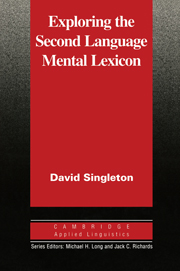Book contents
- Frontmatter
- Contents
- Series editors' preface
- Foreword
- Acknowledgements
- I INTRODUCTION AND PROLEGOMENA
- II RESEARCH REVIEW
- III EVIDENCE FROM THE TRINITY COLLEGE DUBLIN MODERN LANGUAGES RESEARCH PROJECT
- 5 The Trinity College Dublin Modern Languages Research Project in broad outline
- 6 Findings on form and meaning in the L2 mental lexicon
- 7 Findings on the cross-linguistic factor in lexical processing and acquisition
- 8 Findings on communication strategies
- IV CONCLUSION
6 - Findings on form and meaning in the L2 mental lexicon
Published online by Cambridge University Press: 05 October 2012
- Frontmatter
- Contents
- Series editors' preface
- Foreword
- Acknowledgements
- I INTRODUCTION AND PROLEGOMENA
- II RESEARCH REVIEW
- III EVIDENCE FROM THE TRINITY COLLEGE DUBLIN MODERN LANGUAGES RESEARCH PROJECT
- 5 The Trinity College Dublin Modern Languages Research Project in broad outline
- 6 Findings on form and meaning in the L2 mental lexicon
- 7 Findings on the cross-linguistic factor in lexical processing and acquisition
- 8 Findings on communication strategies
- IV CONCLUSION
Summary
A large part of Chapter 4 was devoted to the question of whether or not the L2 lexicon is qualitatively different from the L1 lexicon in exhibiting ‘primarily phonological’ (Laufer, 1989: 17) as opposed to semantic connections between its ‘entries’. In this connection, a critique was mounted of Meara's interpretation of the Birkbeck Vocabulary Project data as supporting the form-driven view of the L2 mental lexicon.
Meara's work was in fact the starting-point for our own scrutiny of the mental lexicon within the context of the TCD MLRP. In fact, at the outset, we expected to be confirming Meara's position and to be able to interpret our data in the same way that Meara had interpreted his word-association test results. However, from the pilot phase of the project onwards we were obliged to conclude that our findings simply would not fit into that particular mould. This chapter presents some of the evidence on which that conclusion was based.
C-test results from the pilot phase of the project
The first two papers on the L2 mental lexicon to emerge from the project were presented at the Ninth World Congress of Applied Linguistics and published shortly thereafter (Little & Singleton, 1992; Singleton & Little, 1991). These brought to bear on the issue of form and meaning in the L2 lexicon the results of the French and German C-tests administered during the 1988–89 session during the pilot phase of the TCD MLRP.
- Type
- Chapter
- Information
- Exploring the Second Language Mental Lexicon , pp. 220 - 237Publisher: Cambridge University PressPrint publication year: 1999

